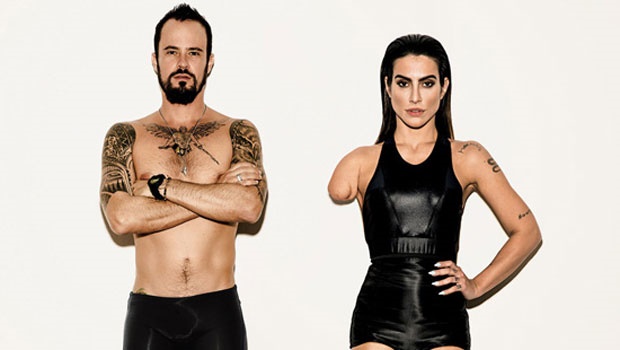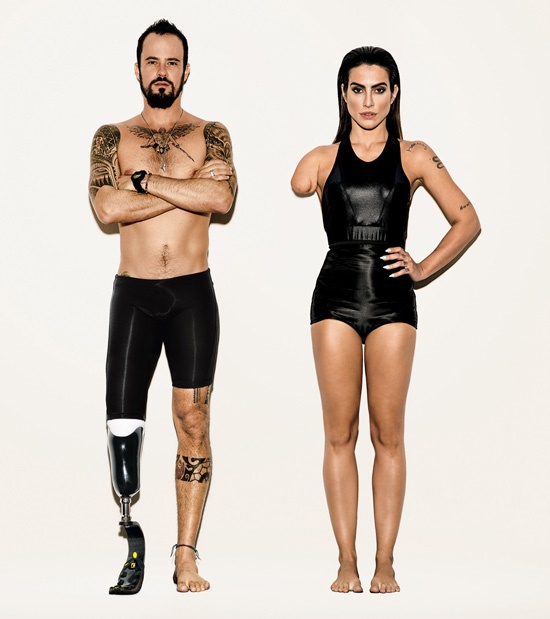
Although still recovering from the thrill of the recently completed Olympic Games, host nation Brazil is now gearing up for the Paralympic Games. The Daily Mail reports that the country’s edition of Vogue Magazine has published an ad to encourage support for the upcoming Games. However, instead of featuring Paralympians, the ad features able-bodied actors who through the use of Photoshop, were depicted as disabled people.
The campaign
The controversial ad, posted on the Vogue Brazil Instagram page, shows actress Cleo Pires with only one arm, and actor Paulo Vilhena with a prosthetic leg. The ad was inspired by Paralympians Bruna Alexandre and Renato Leite, although they did not appear in the principal images.
A photograph of the actors happily posing with the Paralympians can be found on Alexandre’s Instagram account.
In an English caption to the picture, published in The Daily Mail, the Paralympian expressed her joy at being involved in the campaign. She said, “Personally, I have been clear that I am so proud to be a part of this campaign that the magazine Vogue began to publish the first pictures of this beautiful work.”
Read more: 10 SA female Paralympians who achieved glory despite the odds
Social media reaction
Although Alexandre was pleased with the ad, social media was buzzing with intense condemnation of it. Twitter user @BethAClark95 commented: "I can't even begin to describe how out of order #VogueBrazil are for their stance on Paralympic athletes." @oliveluv63 also conveyed her dismay by tweeting: "The fact that #VogueBrazil didn't use ACTUAL disabled people in their ad is sickening."
I can't even begin to describe how out of order #VogueBrazil are for their stance on Paralympic athletes ??
— Beth? (@BethAClark95) August 26, 2016
The fact that #VogueBrazil didn't use ACTUAL disabled people in their ad is sickening. https://t.co/LrJO9uQSxc
— Olive???????? (@oliveluv63) August 27, 2016
In conversation with the Huffington Post, a spokesperson of the Brazilian edition of Vogue explained that although the magazine featured the campaign, they were not responsible for its production. According to them, Pires and Vilhena produced the ad together with publicity agency, Agência África. It is understood that the actors are endorsers of the Brazilian Paralympic Committee.
The Vogue Brazil spokesperson defended the publication of the ad by stating: “Vogue respects the opinions of readers who disagreed with the campaign format, but reiterates its commitment to promote the importance of Paralympic games. We will continue to support all of the Paralympic committee initiatives that can increase the number of attendees at the Paralympic games.”
What was Vogue Brazil's real message?
If they are as supportive of the Paralympic Games as they claim to be, their statement prompts the question of why they chose to publish an ad displaying popular celebrities, rather than genuine Paralympians. Vogue Brazil’s actions cause one to wonder whether they believed that Paralympians such Alexandre and Leite were lacking in certain respects, which made them unsatisfactory to make an appearance in the magazine. It is implied that the publication, may be of the opinion that actors such as Pires and Vilhena, compensate for the supposed deficiencies of the Paralympians.
The most obvious difference between the actors and Paralympians is their physical appearance, with Pires being noticeably more slender than Alexandre and Vilhena being somewhat manlier than Leite. It is apparent that this difference could have enticed Vogue Brazil to include the ad. If so, this then leads one to suspect whether the magazine’s true intention was to perpetuate a particular bodily aesthetic, masked by the promotion of disabled persons’ participation, in international sport.
Ultimately, it is not clear that Vogue Brazil’s featuring of the ad relays advocacy of Paralympic Games. Instead, it hints at inadequacy of Paralympians, making it unsurprising that social media users were up in arms about the magazine’s deeds.
What do differently-abled people think of the campaign?
W24 spoke to Tracey Todd, motivational speaker, writer, mother and newlywed, who also happens to be differently-abled. This is her comment on the campaign:
“I don’t think that Vogue Brazil intended to insult people living with disabilities by using models instead of real Paralympians for their campaign. Vogue is a high-end fashion publication where it’s all about perfect bodies and extreme beauty, which we all know does not exist in real life.
The Vogue Brazil Paralympic campaign was clearly orchestrated by ignorance. The fact that they used models instead of Paralympians is disrespectful and understandably hurtful to those of us living with disabilities and dealing with the related challenges each and every day of our lives.
It sends out a very negative message to society: disabled people are not good enough, pretty enough, talented enough, athletic enough or good enough role models to feature and be recognised for their achievements. It's quite sad, really.”
By publishing the ad, Vogue Brazil reinforced a mentality supporting the idea that disabled people are insufficient. This suggests that perhaps the magazine should in future, more carefully contemplate the ads that they feature.
More from Tracey Todd on W24:
Why photoshopping disabilities onto models hurts differently-abled people




 Publications
Publications
 Partners
Partners















